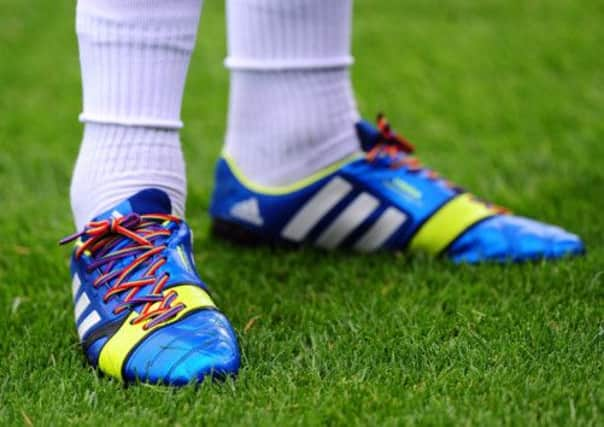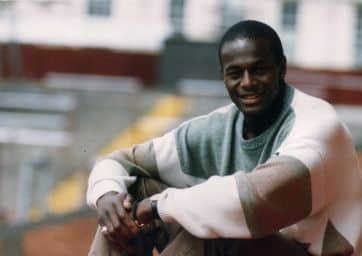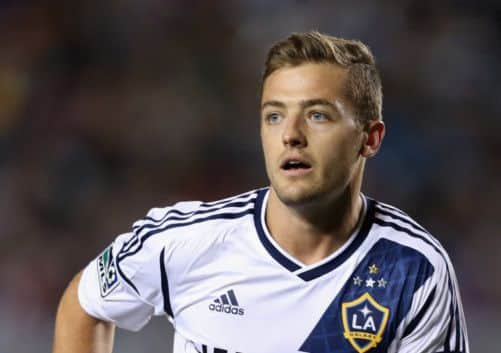Breaking the taboo of gay footballers


It remains to be seen how many United players will use them, or even if they are allowed to. It was only after a conversation on Twitter that Paton, pictured below, received the package from Paddy Power, the Irish bookmaker, which has been inviting professional players across Britain to string up their boots this weekend in colours symbolic of the international gay-pride movement.
“I’m not actually sure if the club wants us to do it because I don’t think Paddy Power went through them or the SPFL,” says Paton. “It’s just something they took upon themselves. I think some people see it as cheap advertising, but if we are allowed to wear the laces, I’ll certainly be doing it. If there are any gay footballers out there, I want them to know that they are as welcome to play the game as the rest of us. I think football’s gay-friendly.”
Advertisement
Hide AdAdvertisement
Hide AdDespite the support of Stonewall, the gay rights charity, Paddy Power has put a few noses out of joint with its impromptu initiative, dismissed by many – including Manchester United – as a crass publicity stunt, which has bypassed the game’s authorities and perpetuated stereotypes with its tasteless slogan, “Right Behind Gay Footballers”.


Certainly, it could have been executed more professionally, but maybe Stonewall can be excused for turning a blind eye to its partner’s latest masterclass in ambush marketing. If nothing else, it has got the game asking questions again, the same questions, sadly, that have been asked, without answer, since Justin Fashanu took his own life 15 years ago.
Why is the former Norwich City, Nottingham Forest and Hearts player still the only high-profile British footballer to declare himself gay? Why does the sport not address homophobia with the same zero tolerance that it does racism or sectarianism? And whose responsibility is it anyway?
In the language its punters understand, Paddy Power states in its press release that the odds of there being not one gay player among Britain’s 5,000 professionals must be a “quadragintillion to one”. There is, says the company, as much chance of predicting the correct score in 500 consecutive matches. Of course, there is debate as to how many of the national population are gay – never mind whether football, as opposed to, say, the fashion industry, should be expected to reflect that ratio – but you get the point.
Assuming that there are gay players in Britain, why do they not feel able to come out? It used to be said that the dressing-room, with its shared showers and “don’t-pick-up-the-soap” banter, was a deterrent, but Paton is anxious to nail that particular myth. The 26-year-old midfielder, who has also played for Partick Thistle and Queen’s Park, insists that players nowadays are interested only in what a team-mate does on the pitch.


“Football takes place in a special environment, where there is plenty of banter flying about, but I’ve never been in a dressing room where, if a player was to come out, it would be frowned upon. Every club I’ve been at has had a good bunch of lads. It doesn’t matter your race, your sexuality or whatever... it’s about the team. You’re in it together.”
Paton suspects that the problem lies elsewhere, such as in the stands or on the streets, where the vocabulary, and the behaviour, of some fans is still old-fashioned enough to alienate the gay community. For all that football has addressed racism, and prohibited the singing of sectarian songs, it is still acceptable to chant that Jimmy Hill is a poof and the Hibees are gay.
“I think a lot of it is to do with the fans, and the players’ perception of how they will react,” says Paton. “Football’s a harsh game. It can be friendly banter, but it can be hurtful at the same time. Many fans don’t realise what they’re actually chanting. I’ve been there myself, singing certain songs that you don’t really know the meaning of. You just sing along with everyone else. It only takes one or two people in a crowd to start shouting, and then everybody’s doing it.”
Advertisement
Hide AdAdvertisement
Hide AdThe question is: how much of that is homophobic? Of all the unacceptable conduct in and around football grounds, that which discriminates against gay players is relatively limited. Perhaps the problem is not so much homophobia in particular as anti-social behaviour in general.
Jack Ross, of PFA Scotland, says: “I’ve sat with the kids at grounds where people use the ‘c’ word. Now, to me, that’s just as offensive. I might be old-fashioned, but I find that a pretty disgusting thing to say in front of children.”
Ross takes homophobia seriously , but he also wonders if concern about it is speculative. The assumption seems to be that all closet gays are afraid of football’s reaction, but who is to say that those players would have come out in another walk of life? “There’s a lot of conjecture involved,” says Jack. “There’s a big element of the unknown. It’s a balancing act between exaggerating the issue and recognising that it needs to be addressed.”
While other athletes, such as rugby’s Gareth Thomas, have come out while they are still playing, British football continues to wait for the high-profile admission that would test the water. Robbie Rogers, an American winger with Leeds United, revealed earlier this year that he was gay, but he retired from the game and later returned to it with Los Angeles Galaxy. The only reference point on these shores is Fashanu, who hanged himself in a lock-up garage in 1998.
You would like to think that progress has been made since then, but there have been no cases with which to prove it. The extent of the prejudice will be unclear until a player comes out, but a player will not come out until he knows the extent of the prejudice. Apart from Fashanu, the nearest thing British football has to a victim is Brighton & Hove Albion, whose catchment area includes the town’s large gay community. A report last season found that the club’s fans were subjected to homophobic abuse at more than 70 per cent of their matches. “We can see you holding hands”, “does your boyfriend know you’re here?” and much worse have been regular chants on the south coast for years.
“Brighton fans have been the subject of ‘banter’ about the city’s gay community for as long as many of our fans can remember,” said Sarah Watts, secretary of Brighton & Hove Albion Supporters Club. “It wouldn’t be described as ‘banter’ if the taunts and chants were about skin colour. Something would have been done by now to stop it.”
Nor is the club’s problem caused only by supporters. Colin Kazim-Richards, then a Blackburn Rovers player, was charged in connection with an alleged homophobic gesture made to Brighton fans in February. And, in an away match not so long ago, the official programme called for a “backs-to-the-wall” performance by the home side.
Brighton have kept their own counsel these last few days due to reservations about the Paddy Power “campaign”. They are thought to believe that, if the bookmaker really cared about the issue, and was interested in securing more than just a fast buck, it would have put pressure on the governing bodies, as Brighton repeatedly have down the years.
Advertisement
Hide AdAdvertisement
Hide AdThey are also among those who object to the slogan –“Right Behind Gay Footballers” – although there are many who like the terminology. “Some people have said that it’s reinforcing the stereotypes, but in my view, it’s the best way to appeal to the mass market,” says Stephen Hendry, player-manager of Saltire Thistle, a Glasgow-based, gay-friendly football club. “You have to speak to football people in the language that they speak rather than in the language of another boring government campaign.”
Hendry says that the idea is not to put pressure on gay players to come out, but he likes to think that, if there were one, he would be followed by another and another. It will take a brave man to be the gay community’s pioneer in football, but according to Hendry, there might be unforeseen benefits. “The first person who does it will end up quids in. Football is one of the few markets that have not tapped into the pink pound. A lot of guys I know are not interested in football, but if a player came out, they would want to know all about him and who he played for. He would be the gay David Beckham.”
Saltire Thistle, formed three years ago, have enjoyed two consecutive promotions in the Gay Football Supporters Network League, but they are also making strides in the Glasgow & District Sunday Championship, where heterosexual teams have already stopped shouting “get up ya poof” and other side-splittingly funny one-liners.
Thistle were set up to provide a safe and welcoming environment for gay footballers who were uncomfortable playing elsewhere. Established by two founding members, they now have more than 40 at the club, which Hendry admits is not necessarily a good thing.
A better sign of progress would be a game without segregation, a game in which straight and openly gay players could happily compete in the same team. When football has made that step, when it has become what Hendry, Paddy Power, Stonewall and the rest want it to become, Saltire Thistle will be redundant.